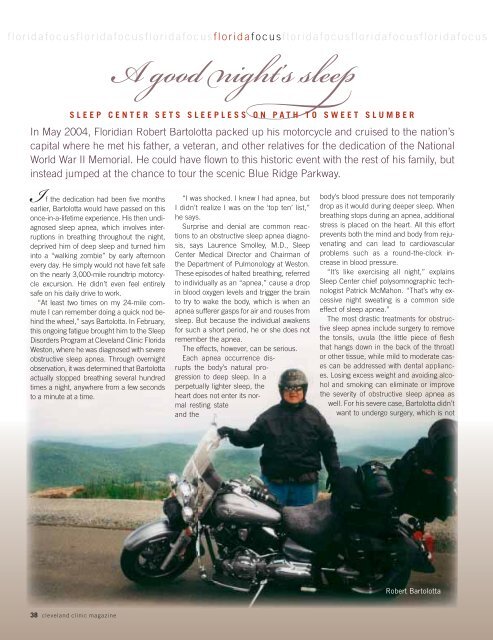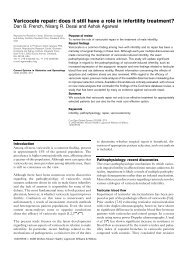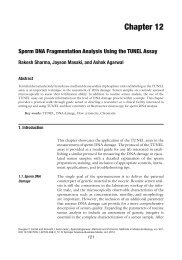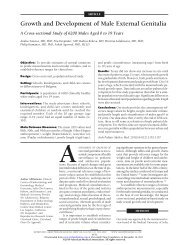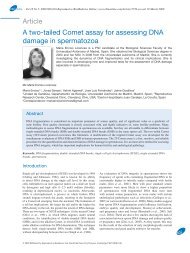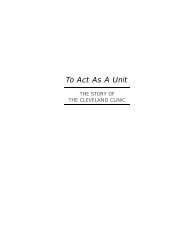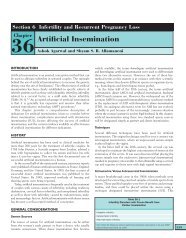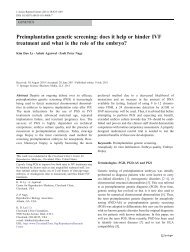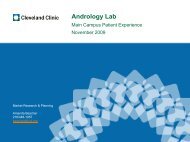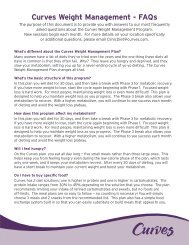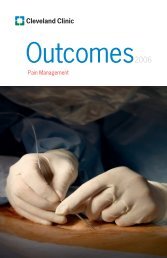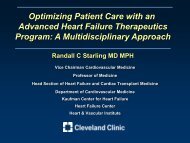floridafocusfloridafocusfloridafocusfloridafocusfloridafocusfloridafocusfloridafocusA good night’s sleeSLEEP CENTER SETS SLEEPLESS ON PATH TO SWEET SLUMBERIn May 2004, Floridian Robert Bartolotta packed up his motorcycle and cruised to the nation’scapital where he met his father, a veteran, and other relatives for the dedication of the NationalWorld War II Memorial. He could have fl own to this historic event with the rest of his family, butinstead jumped at the chance to tour the scenic Blue Ridge Parkway.I f the dedication had been five monthsearlier, Bartolotta would have passed on thisonce-in-a-lifetime experience. His then undiagnosedsleep apnea, which involves interruptionsin breathing throughout the night,deprived him of deep sleep and turned himinto a “walking zombie” by early afternoonevery day. He simply would not have felt safeon the nearly 3,000-mile roundtrip motorcycleexcursion. He didn’t even feel entirelysafe on his daily drive to work.“At least two times on my 24-mile commuteI can remember doing a quick nod behindthe wheel,” says Bartolotta. In February,this ongoing fatigue brought him to the SleepDisorders Program at Cleveland Clinic FloridaWeston, where he was diagnosed with severeobstructive sleep apnea. Through overnightobservation, it was determined that Bartolottaactually stopped breathing several hundredtimes a night, anywhere from a few secondsto a minute at a time.“I was shocked. I knew I had apnea, butI didn’t realize I was on the ‘top ten’ list,”he says.Surprise and denial are common reactionsto an obstructive sleep apnea diagnosis,says Laurence Smolley, M.D., SleepCenter Medical Director and Chairman ofthe Department of Pulmonology at Weston.These episodes of halted breathing, referredto individually as an “apnea,” cause a dropin blood oxygen levels and trigger the brainto try to wake the body, which is when anapnea sufferer gasps for air and rouses fromsleep. But because the individual awakensfor such a short period, he or she does notremember the apnea.The effects, however, can be serious.Each apnea occurrence disruptsthe body’s natural progressionto deep sleep. In aperpetually lighter sleep, theheart does not enter its normalresting stateand thebody’s blood pressure does not temporarilydrop as it would during deeper sleep. Whenbreathing stops during an apnea, additionalstress is placed on the heart. All this effortprevents both the mind and body from rejuvenatingand can lead to cardiovascularproblems such as a round-the-clock increasein blood pressure.“It’s like exercising all night,” explainsSleep Center chief polysomnographic technologistPatrick McMahon. “That’s why excessivenight sweating is a common sideeffect of sleep apnea.”The most drastic treatments for obstructivesleep apnea include surgery to removethe tonsils, uvula (the little piece of fl eshthat hangs down in the back of the throat)or other tissue, while mild to moderate casescan be addressed with dental appliances.Losing excess weight and avoiding alcoholand smoking can eliminate or improvethe severity of obstructive sleep apnea aswell. For his severe case, Bartolotta didn’twant to undergo surgery, which is notRobert Bartolotta38 cleveland clinic magazine
floridafocusfloridafocusfloridafocusfloridafocusfloridafocusfloridafocusfloridafocusImage, left: Electrode placement fora sleep study.Image, right: A sleep technologistmonitors a patient during a study.guaranteed to fi x the problem, and insteadopted for a treatment called ContinuousPositive Airway Pressure (CPAP).Sleep Center technologists fi tted Bartolottawith a mask and machine to keep hisairway open at night. This CPAP device is ashoebox-sized air pump connected to afacemask by a long tube. It pressurizes theair he breathes just enough to prevent hisairway from collapsing as his throat musclesrelax during sleep, but not so much that hecan’t easily exhale. Bartolotta compares it towearing a scuba regulator, from the feel ofthe mask to the oddly comforting sound ofair streaming in and out.From the first night Bartolotta wore theCPAP device, the number of apneas heexperienced was significantly reduced.He felt more energetic during the dayand his daytime blood pressure wentdown as well. His commute was no longera cause for worry. After nearly a yearof using the device, he returned to theSleep Center to undergo evaluation for amore Acompact, travel-friendly version.t the Sleep Center, a technologistcarefully measures Bartolotta’s head andattaches small metal electrodes to his scalpand face with a toothpaste-like adhesive.These will measure brain waves and facialmuscle movements as he sleeps. The sleeptechnologist also adheres electrodes trailedby a rainbow of wires to Bartolotta’s legsand chest to track muscle motion andheart rate. A blood oxygen monitor clipsonto a fi nger, and a tube to measure airfl owis inserted in his nostrils. Belts around thechest and waist will measure the physicalmotion of breathing, and a video camerastands by to capture tossing and turning.Two technologists will be on hand all nightto ensure the electrodes stay attached andindicate activity in patient data logs.Though all this wiring and equipmentmight seem a bit intimidating, the room inwhich Bartolotta sleeps is anything but.With soft lighting, rich wood paneling andjewel-toned bed linens framed by an ornateheadboard, the accommodations are morereminiscent of a hotel than a medical laboratory.“Except, of course, for the whiteboard with the ‘Nursing Assistant’ note onit,” laughs Bartolotta.The unusually inviting hospital setting isone of the quality assurance requirementsthat recently earned the four-bed Sleep Centeraccreditation by the American Academyof Sleep Medicine (AASM). To gain this status,the center passed a full inspection by anaccrediting physician who scrutinized everythingfrom lab techniques to bathroom facilities.The academy standards are designed toensure the highest quality levels in patientcare and comfort.Staff credentials also are an importantfactor in AASM accreditation. After a patientsuch as Bartolotta visits the lab, one of threeregistered polysomnographic technologistspours over the sleep study, called a polysomnogram,viewing six hours’ worth ofcaptured data in 30-second increments.(see graph, page 40). As lines plotting thepatient’s life functions zigzag across thecomputer screen, the technologist notestransitions into various sleep states andsleep disturbances, such as apneas. He assignsa score based on the number of disturbances.As the American Board of SleepMedicine-certifi ed director, Dr. Smolley reviewsany conclusions made.Almost all of the more than 1,000 patientsreferred to the Sleep Center each year aresuspected sleep apnea sufferers. The SleepCenter also evaluates individuals with othersleep disorders, such as restless leg syndromeand narcolepsy, which entails extremesleepiness and a tendency to fallasleep at inappropriate times.In cases of suspected sleep apnea, thesleep study is recommended to confi rm diagnosis,which is based mainly on medicalhistory. A follow-up study, usually performedon a second night but sometimes during thesecond half of a single-night study, allowstechnologists to customize the pressure settingEon a CPAP machine.yes light up behind metal-rimmedglasses when Dr. Smolley, an exuberant pulmonologist,describes his team’s work. Thecenter’s contributions have been added to arecent wave of change in the fi eld of sleepmedicine, a development driven by the serioushealth risks posed to at least 40 millionAmericans who suffer from chronic sleepdisorders, according to the National Institutesof Health.While physicians have been aware ofcardiovascular implications of sleep apneasince the 1970s, it was only in the late1990s that physicians and researchersstarted assembling solid clinical and laboratorydata, says Dr. Smolley, who built theSleep Disorders Program from the groundup when he came to Cleveland ClinicFlorida in 1995.“There’s strong evidence today that CPAPtreatment for obstructive sleep apnea is invaluable.It not only helps a patient get agood night’s sleep and feel better the nextday, but it can abort the cardiovascular consequencesof sleep apnea - the high bloodpressure, the heart failure and cardiac arrhythmia,”says Dr. Smolley. “And there’s avery strong association between atrial fibrillationand sleep apnea.”Beyond cardiovascular consequences, inApril 2005 the Archives of Internal Medicinereported study results associatingsleeping for less than six hours or for morethan nine hours a night with increased riskwww.clevelandclinic.org 39


